The Top MBA Employers in Texas

The Lone Star State, to many, offers a winning combination of nature and culture; business and pleasure. When it comes to contemporary art and live music, Houston, Austin, and Dallas give New York and Los Angeles a run for its money. With its abundant nature reserves, state parks, deserts, and beaches, Texas also offers plenty of bucolic settings to clear one’s head.
Continue reading…UT Austin 2019-20 MBA Deadlines Revealed

The University of Texas at Austin McCombs School of Business revealed its next wave of MBA deadlines for its full-time program.
New UT Austin MBA Deadlines
Round One
Application Deadline: Oct. 8, 2019
Decision Notification: Dec. 17, 2019
Round Two
Application Deadline: Jan. 7, 2020
Decision Notification: March 26, 2020
Round Three
Application Deadline: March 31, 2020
Decision Notification: May 7, 2020
The Texas MBA Programs Guide: Houston vs. Dallas

If you’re looking to earn a Texas MBA, where should you go to school? Should you choose a top MBA program in Dallas or Houston? First, we need to take a look at the cities.
Living in Dallas vs. Houston
First, let’s take a look at the cost of living in Dallas vs. Houston. According to Numbeo, the world’s most extensive database containing user contributed data about cities, the overall cost of living is relatively similar: $4,242 in Houston compared to $4,000 in Dallas. Houston barely edges out Dallas with a slightly higher cost of living, and here’s how that’s broken down.
- Consumer Prices: 35 percent higher in Houston
- Rent Prices: 7.30 percent higher in Houston
- Restaurant Prices: 27 percent higher in Houston
- Groceries Cost: 95 percent higher in Houston
- Local Purchasing Power: 26 percent lower in Houston
Other things to consider when choosing between Dallas and Houston include:
- Industries
- Houston is known for being the oil capital and is an ideal location for jobs in the energy industry.
- Dallas, on the other hand, is known for real estate (Tramelle Crow is headquartered here), as well as hedge funds and asset management firms.
- Economic Development: According to Site Selection Magazine, Houston and Dallas are comparatively equal when it comes to economic development, ranking second and third respectively.
- Top Companies: Houston edges out Dallas for being home to more Fortune 500 companies. In fact, Houston is home to 27 top companies compared to 14 in Dallas. However, they rank second and third respectively.
However, according to Forbes, “while Houston and Dallas have decent amenities (and having better ones surely wouldn’t hurt), they aren’t places that offer a unique lifestyle brand, such as charming architecture or a cutting-edge arts scene.”
Texas MBA Programs
The next step is to compare the top three MBA programs in each city. In particular, we wanted to take a look at the tuition rates (two years), GMAT averages, and post-graduation salaries at each program in each city to get a well-rounded picture.
Overall, there are a few things to note right away.
- The top full-time MBA programs in both cities are ranked well. However, Houston programs tend to rank higher on major ranking sites such as The Economist and Bloomberg Businessweek.
- Houston tends to be more expensive regarding tuition ($93,052 vs. $69,191), but it also pays a higher salary ($110,000 vs. $92,000). This balances out with around a $25,000 difference in tuition and a $20,00 difference in post-graduation salary.
- Finally, GMAT averages for class profiles tend to be higher in Houston as well (688 vs. 660).
Here’s how it all breaks down per school.
Top 3 Houston MBA Programs
McCombs School of Business – University of Texas at Austin
The McCombs School of Business offers a full-time MBA, an Evening MBA, a Weekend MBA, and an Executive MBA program. And it’s considered one of the top business schools in the country, consistently ranking highly on various lists, including ranking 28 according to The Economist.
- Tuition Rates (two years): $91,000
- GMAT Averages: 703
- Post-Grad Salaries (Mean): $117,068
Rice University – Jones Graduate School of Business
The Jones Graduate School at Rice University offers a full-time MBA program, an MBA for Professionals (part-time), and an Executive MBA Program. The school’s full-time MBA program ranked 10th on the Bloomberg Businessweek list in 2017.
- Tuition Rates (two years): $116,000
- GMAT Averages: 711
- Post-Grad Salaries (Mean): $112,158
Mays Business School – Texas A&M University
The Mays Business School has both a full-time MBA program as well as a part-time Professional MBA program. In addition, the school offers an Executive MBA. In 2017, The full-time MBA program ranked 20th overall by Forbes, and 22nd overall by Bloomberg Businessweek.
- Tuition Rates (two years): $72,158
- GMAT Averages: 649
- Post-Grad Salaries (Mean): $103,299
Top 3 Dallas MBA Programs
Naveen Jindal School of Management – University of Texas at Dallas
The Naveen Jindal School offers a full-time MBA, part-time Professional MBA, Executive MBA, and Global Leadership Executive MBA program. The full-time MBA is well ranked according to the U.S. News & World Report, ranking 16th among public university programs in the U.S.
- Tuition Rates (two years): $27,603
- GMAT Averages: 678
- Post-Grad Salaries (Mean): $86,644
Cox School of Business – Southern Methodist University
The Cox School of Business at SMU offers a full-time MBA, Fast Track MBA, Professional MBA (part-time), and an Executive MBA program. Most recently, SMU Cox achieved its first Financial Times ranking at 91st.
- Tuition Rates (two years): $91,952
- GMAT Averages: 661
- Post-Grad Salaries (Mean): $96,587
Neeley School of Business – Texas Christian University
At the Neeley School of Business at TCU, MBA applicants can apply to the full-time MBA, Accelerated MBA, Professional MBA (part-time), Accelerated Professional MBA, or MBA for Energy Professionals program. The Economist ranked the Neeley School MBA ranks 61st overall on its most-recent ranking.
- Tuition Rates (two years): $88,020
- GMAT Averages: 640
- Post-Grad Salaries (Mean): $93,010
Dallas vs. Houston Breakdown in Charts
When breaking down the data between MBA programs in Dallas and Houston, here’s what it looks like:
Texas MBA Tuition
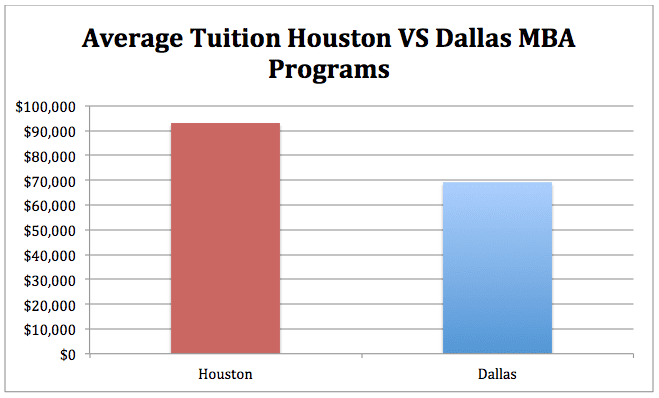
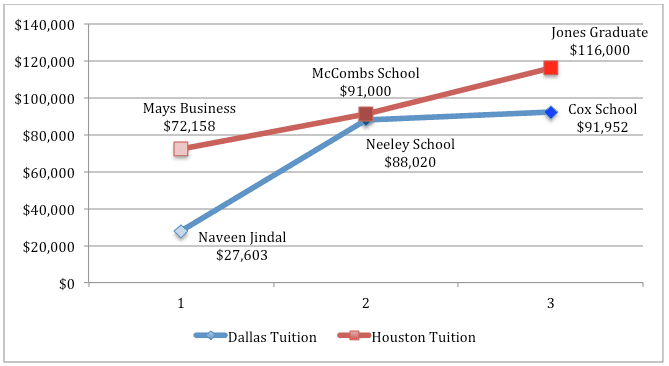
Texas MBA GMAT Averages
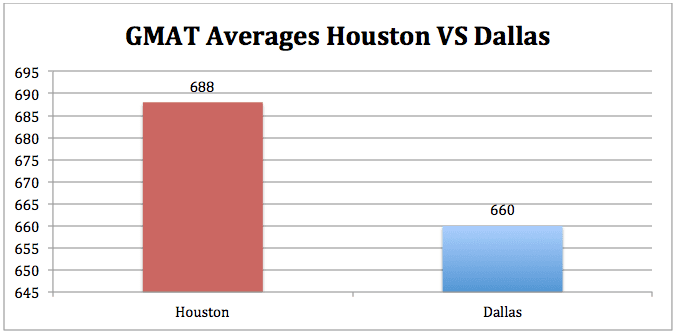
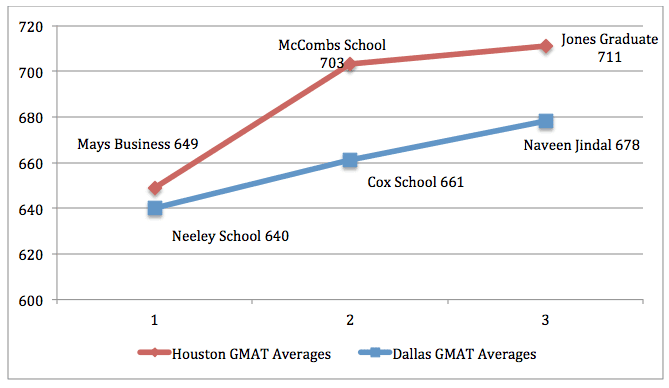
Texas MBA Post-Graduation Salaries
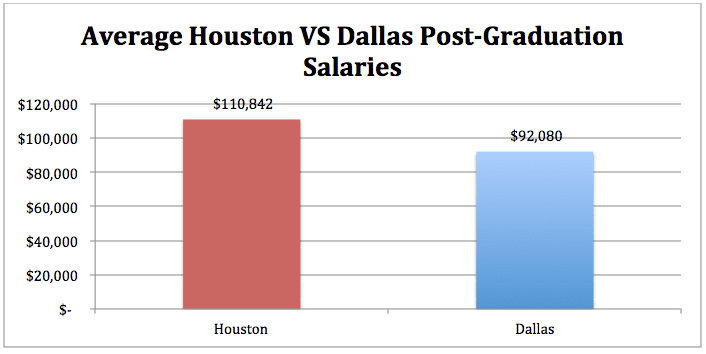
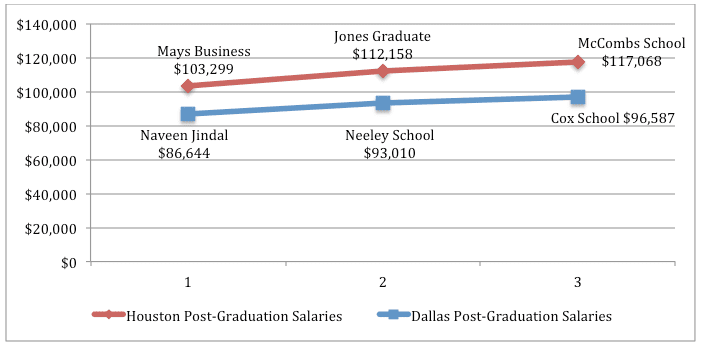
Here Are the Front Runners For Amazon’s New HQ2 Campus

Last week, 20 cities in the United States and Canada were informed by Amazon that their bid to host the tech giant’s second headquarters, HQ2, was still being considered. Continue reading…
20 Cities Survive Amazon HQ2 Shortlist

Four months after Amazon announced plans to construct a second headquarters, North American cities have been making grandstanding pleas in order to court the ecommerce behemoth. New York City’s mayoral office lit up the Empire State building with Amazon’s glowing orange hue in a symbolic gesture, while certain cities like Chicago went the more extreme route, proposing laws that could funnel income taxes directly back to the company. After much speculation, here is the official Amazon HQ2 shortlist:
- Atlanta
- Austin
- Boston
- Chicago
- Columbus, Ohio
- Dallas
- Denver
- Indianapolis
- Los Angeles
- Miami
- Montgomery County, Md.
- Nashville
- Newark
- New York
- Northern Virginia
- Philadelphia
- Pittsburgh
- Raleigh, N.C.
- Toronto
- Washington, D.C.
Unsurprisingly, most of the cities that made the cut were among the largest in North America, with only one Canadian city—Toronto—left standing. Over 230 cities from the U.S., Canada, and Mexico made official bids for the company’s second headquarters, with Amazon prioritizing tech-centric metros of populations larger than 500,000. In fact, only four of the 20 metro areas—Miami, Nashville, Newark, and Pittsburgh—have a population of less than half a million, with Newark being the smallest of the entrants. Notably, Newark offered perhaps the largest financial incentive to the company, proposing upwards of $7 billion in tax incentives.
How the Amazon HQ2 shortlist was formed is not totally known, according to the New York Times:
“According to people briefed on the process who would speak only anonymously because the deliberations were private, the process was conducted by a team of about a dozen people within Amazon, including economists, human resources managers and executives who oversee real estate. Jeff Bezos, Amazon’s chief executive who was the mastermind behind turning the search into a public process and coined the term “HQ2,” was also involved, the people said.”
At the time of the initial announcement, Amazon released a stream of positive economic statistics about its impact in Seattle, home to the original headquarters. The company stated (although these statistics are still not yet verified by any source outside of Amazon) that it added $38 billion USD to the value of the city from 2010-16 alone, due to its investments and rapidly expanding workforce. Detractors argue that the financial value added to the city did not positively impact the quality of life, however, with more than 51 percent of Seattle residents making less than $50,000 per year and more than quarter of city residents earn less than $25,000 per year. The influx of high-level employment also contributed to rapidly rising housing costs and poorer traffic.
Experts from CNBC believe that Raleigh might be the front-runner of the remaining entrants, which matches the initial bid criteria the most. Although some speculate that Austin most aligns up with Amazon’s future. The company declined to announce when the final decision will be made.
What Amazon Means For MBA Students
Not so secretly, Amazon has become one of the world’s largest MBA recruiters, hiring students from top schools all over the world. We’ve previously outlined the details of why it has become such an attractive destination for business school students.
The company creates a direct pipeline from its MBA internship program to full-time employment, which should rapidly increase with the creation of HQ2. In a previous interview with the Financial Times, Miriam Park, the Amazon Director of University Programs, highlighted the company’s recruitment strategy:
“The Amazon recruitment process is designed to ensure we hire top candidates with high-growth potential whatever their background may be. As part of this we recruit current MBA students and MBA alumni for permanent and internship opportunities worldwide and see MBAs as an important part of our leadership development. We value people who can balance long-term strategic thinking with tactical execution, and who have the ability to make data-driven decisions.”
Stay tuned for more information about the second headquarters and more potential MBA employment opportunities with MetroMBA.
Social Impact MBAs: Programs That Help Students Make a Difference in the World

For years, social impact has been a growing area of emphasis at business schools. Increasingly, MBA students are stating that a well-paying career isn’t enough: They also want to make a difference.
As Sherryl Kuhlman, the managing director of the Social Impact Initiative at the University of Pennsylvania’s Wharton School, told U.S. News & World Report: “Our students want to make the world go round in a different way. [They are no longer willing to] take a job they don’t like so they can give their money away later. They want to merge the money and the purpose.”
MBA programs incorporate social impact into their programs in various ways, through global experiences, coursework, clubs, competitions, and more. MBA students may also have opportunities to team up with corporations, government agencies, and nonprofit organizations to get hands-on experience during their graduate studies.
So if you’re interested in social impact, what opportunities should you look for within an MBA program?
Centers and Initiatives
Some schools run entire centers and initiatives dedicated to the idea of social change. Typically, these centers provide the foundation around which a variety of social impact opportunities are built, including research, career help, events, and course development.
For example, the McCombs School of Business at UT Austin recently launched its Social Innovation Initiative, which provides students, faculty, and the community with preparation to promote social change. The initiative offers graduate-level curricular offerings, with courses such as “Energy Technology and Policy” and “Invisible Global Marketing.” There are also many extracurricular activities such as the Social Impact Investment Fund, a peer-created fund that provides financial support for MBA students pursuing internships in the social impact space.
“The creation of the Social Innovation Initiative is a crucial step in bringing UT’s overlapping communities together to collectively address the world’s most pressing challenges,” Dr. Meeta Kothare, managing director of the initiative, said in a press release. “The interdisciplinary nature of the initiative is key because the most impactful social innovations often result from collaborations among private, public, and social sectors.”
At Stanford Graduate School of Business (GSB), the Center for Social Innovation aims to bring about social and environmental change through research, education, and experiential learning opportunities. For MBA students, the center offers social innovation courses, study trips, the potential to participate in an investment committee, and fellowships to provide leadership opportunities. The school even hosts an annual ceremony each spring drawing together a tight-knit core of students, faculty, and alumni who share a commitment to social innovation. Three classes of awards are handed out to a dozen students at the event, and Dean Emeritus Arjay Miller, 101, attends to encourage the continuation of a community of social innovation he helped found at the GSB while dean from 1969 to 1976.
Then, there’s the Yale School of Management Program on Social Enterprise. This initiative supports faculty, students, alumni, and practitioners in their pursuit of using business skills to achieve social objectives. It does this by offering a span of programs including courses such as “Global Social Enterprise” and “Managing Sustainable Operations,” as well as research, conferences, and publications. For extracurricular activities, students can participate in the Social Impact Lab, a weekly forum with opportunities to engage with industry leaders and each other, as well as the Economic Development Symposium, an annual conference that brings together eminent scholars, action agents, and key opinion leaders to work on solutions to pressing economic development issues.
Programs
For many business schools, social entrepreneurship is offered part and parcel with their MBA degrees. These programs can range from a one-week social enterprise trip overseas to a formal concentration within the MBA program.
At Northwestern University’s Kellogg School of Management, MBA students can elect a Social Impact pathway concentration. This pathway is designed for students who want to create positive social change and includes required courses on a variety of topics from “Leadership and Crisis Management” to “Public Economics for Business Leaders” and “Health and Human Rights.” Within the pathway, there are three tracks: policy, nonprofit, and social innovation, each offering in-depth coursework to position students for their desired careers.
Meanwhile, MBA students at Emory’s Goizueta Business School can explore social impact through an annual seven- to 10-day Social Enterprise @ Goizueta Trip. These trips take students to countries around the world to observe the challenges that local economies face and develop market-based solutions. Alumni and evening MBA students can also travel to Nicaragua to visit coffee farms and meet growers. Full-time MBA students can visit Nicaragua or El Salvador to explore social enterprises on the ground and work on community health projects.
Competitions
Some schools offer hands-on experience in social impact to their students in the form of social venture competitions.
Through Harvard Business School (HBS)’s Social Enterprise Initiative, which aims to educate, inspire, and support leaders across all sectors to create social change, MBA students can participate in the New Venture Competition (NVC). The competition offers participants a grand prize of $50,000 as well as workshop opportunities, feedback, and business plan development advice.
Designed for students and alumni interested in using their business skills to create innovative approaches to tackling social problems, the Social Venture Competition at NYU Stern School of Business is similar to that of HBS’s NVC. Over the last 11 years it has awarded more than $900,000 to startup social ventures developed by students.
Clubs
Net Impact is one of the most popular social impact clubs, with chapters across the globe. More than 100,000 individuals have joined more than 300 chapters across the world to take on social challenges, protect the environment, and orient business toward social impact. The Net Impact chapter at UCLA Anderson School of Management, for example, has been awarded Gold Status, which recognizes it as a high-performing chapter and qualifies it to serve on the national Net Impact advisory board.
One of highlights of Net Impact is the annual Net Impact Conference, which welcomes attendees from across the globe to hear from keynote speakers, such as Clif Bar CEO Kevin Clearly and Derreck Kayongo, the CEO of the Center for Civil and Human Rights. Attendees at the Net Impact Conference can also take part in a variety of workshops, panels, and boot camps on topics ranging from civic engagement to equity.
In addition to Net Impact chapters, many MBA programs also offer their own social enterprise-focused student organizations. For example, the Social Enterprise Club at Columbia Business School connects students with faculty, alumni, professionals, and organizations to develop business skills and create social, environmental, and economic value.
Scholarships
At Oxford Saïd Business School, MBA students have the opportunity to apply for the Skoll Scholarship, a competitive award for students pursuing entrepreneurial solutions to urgent social and environmental challenges. The scholarship provides funding as well as opportunities for the award winners to meet and interact with world-renowned entrepreneurs, thought leaders, and investors. To qualify, an applicant must have three years of experience in social enterprise and be an incoming MBA student.
At Duke’s Fuqua Business School, there’s the CASE Social Sector Scholarship for incoming daytime MBA students. Scholarship recipients receive at least 25 percent tuition support as well as funding from the CASE Summer Internship Fund. Incoming MBA students who can demonstrate their commitment to applying their business skills in the pursuit of social impact are eligible to apply.
This is far from an exhaustive list—rather it’s a sampling of the wide-ranging opportunities to study social impact across MBA programs around the world. We hope it can provide a jumping off point as you begin to investigate social impact opportunities at your target schools.
